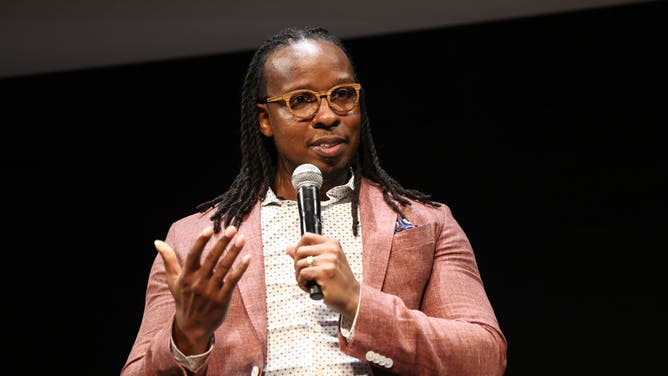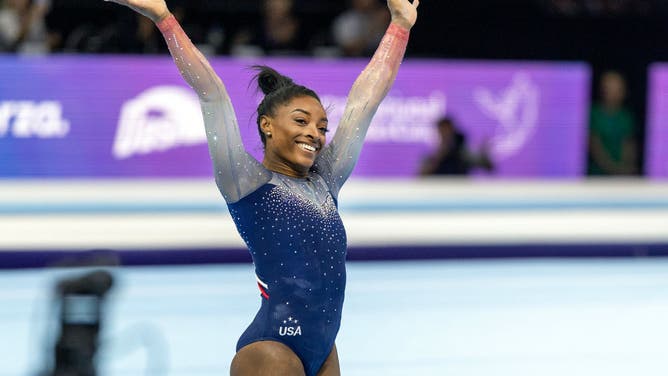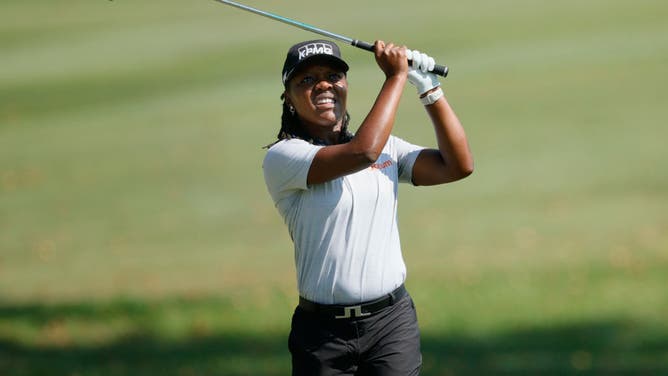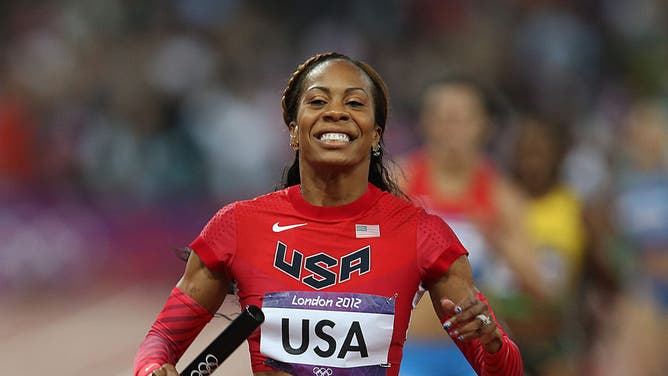ESPN, Ibram X. Kendi Documentary Says Society Views Black Female Athletes As 'Superwomen' Who Can't 'Make Mistakes'
Previously, OutKick did a full review of the first episode of "Skin in the Game," a five-part docu-series produced by ESPN and starring Ibram X. Kendi.
If you missed that, you can catch up here.
Additionally, if you were fortunate enough to not even know that ESPN partnered with race-hustler Ibram X. Kendi (formerly known as Henry Rogers) for this project, you can read all about it here.
I'll wait for you to eagerly catch up on all the great content where ESPN tells you that you're inherently racist just for being an American.

Ibram X. Kendi partnered with ESPN to produce "Skin in the Game," a five-part docu-series that explains why sports are racist. (Photo by Tommaso Boddi/Getty Images for Netflix)
OK, now that all of that is out of the way, we can move on.
As I said in the review of episode one, I care deeply about the OutKick audience, so I watched the show. I know you don't want to do that -- and, frankly, I didn't either -- but at least I got paid to do it. Though, to be fair, not nearly enough.
With that, we move on to episode two...
"Highlights" from ESPN, Ibram Kendi's (a.k.a. Henry Rogers) second episode of "Skin in the Game"
Episode 2 title: "The Invisible Struggle"
On the ESPN press site, the sub-title for this episode is "Are Black Women Athletes Carrying the Weight of the World?" Kendi says tagline and then adds, "in many ways, they are."
As you can glean from the sub-title and Kendi's commentary, this episode is about grandiosity. It starts with a comment from a black female athlete who says that "society views black women, and black female athletes, as these superwomen don't have any room to make mistakes."
Personally, I'm not sure I can name more than 10-15 professional female athletes. I don't view them as "superwomen" and I'm not sure who does. To me, they're just athletes that aren't as big, strong or fast as their male counterparts.
And that's OK! That's why there are women's sports in the first place.
But this episode isn't focused on female athletes. Well, not all female athletes. Just the ones with black skin. Obviously.
"We recognize the physical toll it takes to be an elite athlete, but we ignore the psychological toll. Especially for black women," Kendi pontificates.

According to ESPN, Ibram X. Kendi (a.k.a. Henry Rogers) nothing is more difficult in sports than being a black woman like Simone Biles. (Photo by Tim Clayton/Corbis via Getty Images)
This raises one of my biggest beefs with a lot of the complaints of racism that I hear. In many cases, there's a story that's told where the person claims racism, when in fact, they just experienced something that all humans endure.
Here's an example from when I worked at ESPN. We had a department meeting and one of the talking points was that black employees felt that they couldn't "bring their whole self to work." Meaning, they had to talk and dress differently at work than in other places.
Yes, everyone does. I don't talk to my boss the same way I talk to my friends. Hell, I don't talk to my grandmother the same way I talk to my friends. I don't dress the same way for work as I do when I'm watching TV on my couch.
We all have to adjust our behaviors based on the situation. That's the human experience. Or, we don't and people judge us. Freedom of choice doesn't mean freedom from consequence, even if that consequence is those around you making assumptions based on your appearance.
ESPN documentary "Skin in the Game" and host Ibram X. Kendi (a.k.a. Henry Rogers) rely on calling normal human experiences "racism" when they happen to non-white people
Here's the other issue I take with that Kendi statement. He talks about how we ignore the psychology of athletes for their physical performance.
Yes, that's the job. As I wrote in the review of episode one, feel free to pursue another career if you can't mentally handle the stress of being a professional athlete.
By the way, it's not just athletes. The people who are elite at any job are able to put aside the tough, psychological toll and do their jobs better than everyone else. That's exactly what makes them elite. That's part of the reason everyone isn't elite.

Elite athletes like Patrick Mahomes have mental toughness in addition to their physical talent. (Photo by Kevin Sabitus/Getty Images)
Again, this is taking a normal human experience and making it all about YOU. All of this comes from a place of narcissism, which is currently running rampant through American society. On the one hand, athletes want to be treated "just like everyone else." On the other hand, they don't.
It just depends which situation benefits them more at the time. Oh, hey, another natural human experience!
"For many black women ... there is the fear that asking for help is a sign of weakness," Kendi continues.
I'm going to be a broken record by the end of this, but THIS IS TRUE FOR EVERYONE! We are all afraid of being seen as weak.
Kendi, ESPN introduce us to Mariah Stackhouse, an athlete who struggles with normal athlete issues
The episode continues with the story of Mariah Stackhouse, a black female professional golfer. She and her mother talk a lot about the difficulty of being a black golfer.
They also discuss feeling pressure, as a black athlete, the need to perform well in competition. Apparently, she's the only player on the LPGA Tour who feels pressure to win.
She had a terrible 2021 season where she fell from being the 214th best female golfer to outside the top 300. According to her, she felt "anxiety" on the golf course.
"I felt that pressure to make something happen and make something happen fast," she said.
Yes, that's what happens when you have a bad season. Just ask Justin Thomas. Or any other professional athlete who had a bad season.

Mariah Stackhouse during the 2023 Walmart NW Arkansas Championship. (Photo by Alex Slitz/Getty Images)
Anyways, she got therapy and started meditating. Great, anyone who needs it should pursue those options.
This is not to diminish her story. I love a good "athlete overcomes adversity" story. Everyone does. I just don't like the framing that being a black woman played a role in something that virtually every human experiences.
But, this is where we are. This series is a five-part series on racism in sports. That means they need to find many examples of ... racism in sports. Except, they don't exist. So, they start inventing them. And we're only in episode two!
ESPN can't produce a series on racism without including Jemele Hill because that would be racist
Midway through the episode, Jemele Hill makes her first series appearance! Per usual, she adds almost nothing to the discussion.
She comments on Simone Biles and Naomi Osaka, two black female athletes who quit playing their sports (temporarily) because they couldn't handle the mental toll. Again, totally their right. But Hill claims that people thought they "owned" those women and learned that they didn't.
This is one of Hill's specialties: logical fallacy. This time, she uses the "straw-man" fallacy, which is that she creates an opponent that doesn't exist. I don't know a single person who feels that they "own" either of these women. Most of the people in my life probably couldn't even tell you who they are. Maybe Biles, but probably not Osaka.
Did they face some criticism for walking away? Of course. That comes with the territory of being an athlete. But ask the majority of Americans if they care that Naomi Osaka quit tennis or that Simone Biles quit gymnastics and how much it affected their lives. The answer: it didn't.
Next up, a panel on why black female athletes have it tougher than all other athletes in the world
The episode continues with a panel consisting of Olympians Sanya Richards-Ross and Raven Saunders, psychologist Dr. Mariel Buqué and author Marita Golden.
They continue the same trend of claiming that black female athletes are forced to work harder than their white counterparts. There is no evidence of this, but they claim it with impunity. Kendi and ESPN certainly aren't going to press for actual examples.
"Being a black female athlete definitely comes with more pressure than our white counterparts," Richards-Ross claims. "In order to be considered for the deal, we have to be beautiful, we have to be eloquent, excellent."

Sanya Richards-Ross during the 2012 London Olympics. (Photo by Ian MacNicol/Getty Images)
Yes, those are the characteristics that marketing teams are looking for in all women. And, guess what? Good-looking male athletes who speak well get more endorsement deals, too.
There's nothing else really worth writing about within this panel.
The theme of the episode (and the series) is clear: it's still harder being a black athlete than it is being a white athlete in 2023.
That's the worldview of people like Ibram Kendi's (a.k.a. Henry Rogers) and the decision-makers at ESPN.
Hopefully, episode three dives into some deeper water. Check back to OutKick to find out!